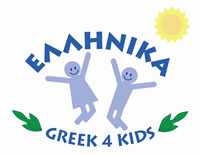CURRICULUM
Greek 4 Kids is committed to working with families to help each child reach his/her potential. It offers a structured, yet fun teaching approach for young children, ranging from toddlers to 12 years, to learn Modern Greek in a stimulating classroom setting. Instruction of Traditional Greek Folk Dances aims to supplement language instruction.
The Program also offers a unique opportunity to kids who do not practice Greek at home to start learning a new language from an early age and to kids who speak Greek at home to get the opportunity to use it in a social and “classroom” like context.
A variety of activities aim to tickle different senses (hearing, touch, vision) and expose children to Greek children’s folk culture in the form of games, songs, prayers, rhymes, music, hands-on activities. Children practice listening and talking while socializing. The class is conducted primarily in Greek to help them enhance their comprehension. Kids learn naturally, not by translating. First they hear, then they understand, and finally they speak. Comprehension always exceeds fluency and speaking will eventually be spontaneous. The classroom themes and materials have been carefully chosen to intrigue the children’s mind and encourage progress at their own pace.
The Greek 4 Kids curriculum emphasizes fun and play. Limits are made clear and defined. Lesson plans are adapted to each age group and the developmental capacity of each child. Material used in class is authentic. A nurturing environment enhances children’s self-esteem and curiosity, promotes independence, creativity, desire to explore the world through imagination, while encouraging them to develop a strong sense of pride and achievement.
Learning is to take place in a natural, un-pressured way by singing, inventing a wide range of games, hopping to an object, watching puppets do exaggerated gestures, drawing, scribbling, use of magnet boards, and so much more. Every child can learn Greek when having fun. It is no different than learning how to speak English, just a little extra stimulation is needed.
Learning two languages is also learning two cultures. It means learning how to ACT in two different cultures. Through arts, drama and music, children become culturally diverse by ACTING Greek, imitating hand gestures, vocal intonations and facial expressions.
